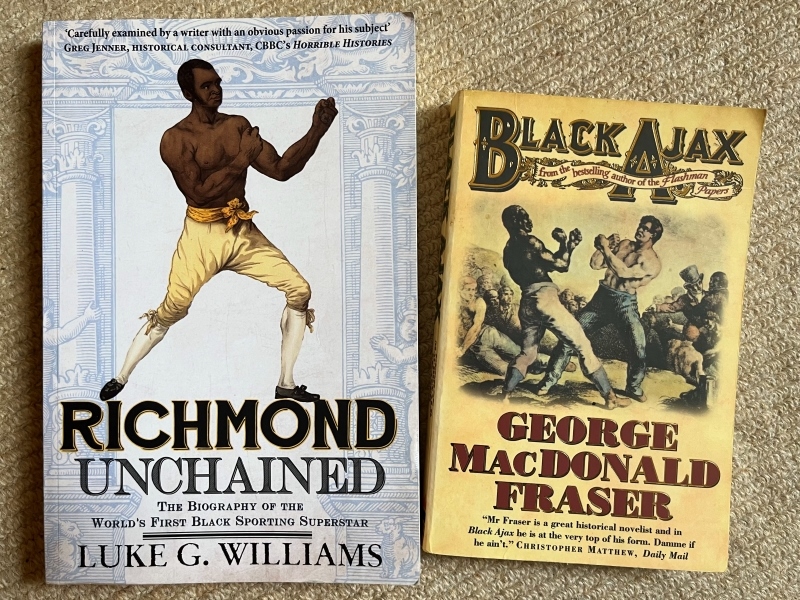
A couple of 'secondary sources' Luke Williams's biography of Richmond and George (Flashman) MacDonald Fraser's fictional account of Tom Molyneaux's life story
A lot of the descriptions of Bill Richmond's life come from later accounts by journalists, produced once he'd become a high profile boxer and also a trainer and fight promoter. They make great reading. The following section is from BOXIANA; or Sketches of Ancient and Modern Pugilism; From the days of the renowned Broughton and Slack to the HEROES of the present MILLING ERA! written by Pierce Egan. It describes one of Richmond's 'amateur' fights whilst in York (he moved to London with his wife by the mid 1790's), and also the provocation for it.

'RICHMOND, in passing through the streets of York, one evening, with a female under his protection, was accosted by one Frank Myers, with the epithets of “black devil,” &c. and who otherwise insulted the young woman for being in company with a man of colour. BILL, full of gallantry, and with a becoming spirit of indignation, requested him to desist for the present moment, but to meet him at the Groves on the next Monday morning, when they would settle this difference, (the circumstance happening on a Saturday night,) to which Myers agreed. The affair of honour being buzzed about on the Sunday, a great concourse of people assembled early the next day to witness the conflict; RICHMOND was there at the appointed hour, and after suffering considerable time to elapse, and Myers not making his appearance, the spectators became impatient, and it was judged expedient that RICHMOND and his friends should repair to house of Myers, to remind him of his engagement. This Myers kept a bagnio, with a woman of the name of Shepherd, at Uggleford, to which play they went and found Myers, who after some hesitation, agreed to go to the Groves, where he was followed by this shepherdess and her flock. The battle now commenced and raged with fury for some time, but upon Myers getting the worst of it, the above Covess and her damsels rushed into the ring to prevent their Bully from being annihilated, and took him away; but the spectators interfering, persuaded Myers to return and finish the battle like a man, who being ashamed of his conduct, agreed to it, when RICHMOND soon taught him very properly to acknowledge, that it was wrong, and beneath the character of an Englishman, to abuse any individual for that he could not help - either on account of his COUNTRY or his colour. Myers, very properly, received a complete milling.'
These were all such larger than life stories, described in fabulous melodramatic prose - they really added a different perspective to the OU chapter. Whilst people like Richmond and Molyneaux were subject to prejudice and abuse and were highly constrained by the social forces in play in the late 18thC /early 19thC there is also a lot of agency exhibited as they 'negotiated' there way through life. I'm glad I've encountered their stories - and will see what more I can find out about them.
Comments
New comment
The highlight of a recent brief trip to the National Portrait Gallery was Lord Byron's Decoupage Screen, and in particular the side of the screen decorated with famous Regency pugilists (the other side is composed of images of actors). Byron was a huge fan - presumably part of 'The Fancy'!
It is such a fascinating object - the boxing images are thought to have been curated and created by Byron's fencing teacher, Henry Charles William Angelo.
There are some larger images of Tom Molineaux - and one that I could pick out of Bill Richmond. Lord Byron apparently took some boxing lessons from Bill Richmond.
The pictures are accompanied by text clips from Boxiana and possibly other pugilistic accounts.
There were also some lovely ceramic statuettes, Tom Cribb could face-off against Tom Molineaux on your Regency mantlepiece.